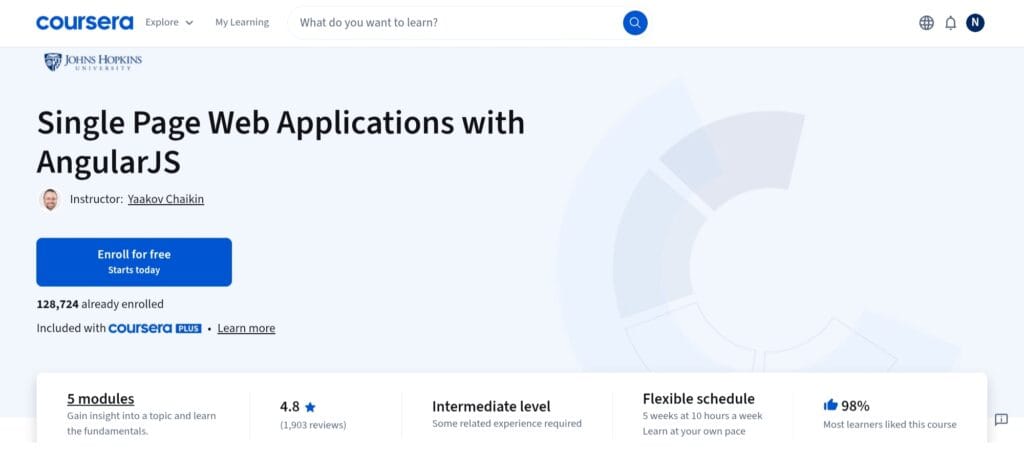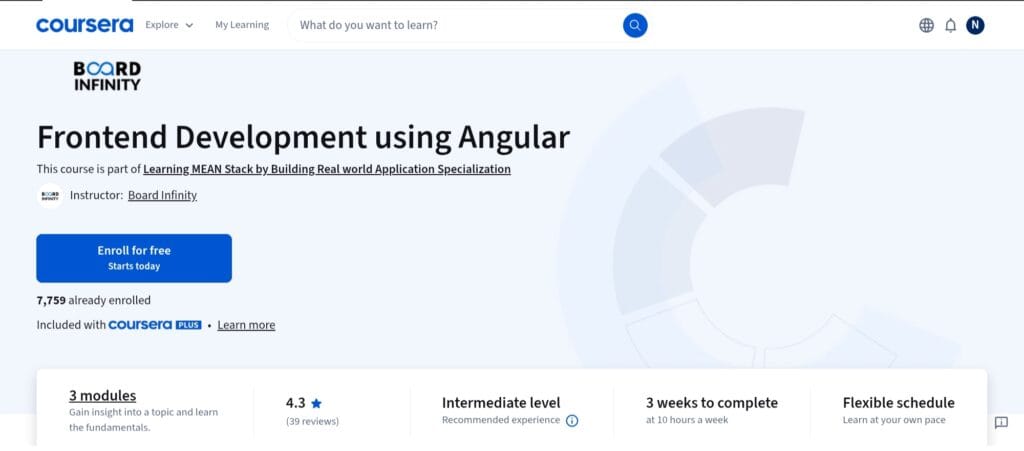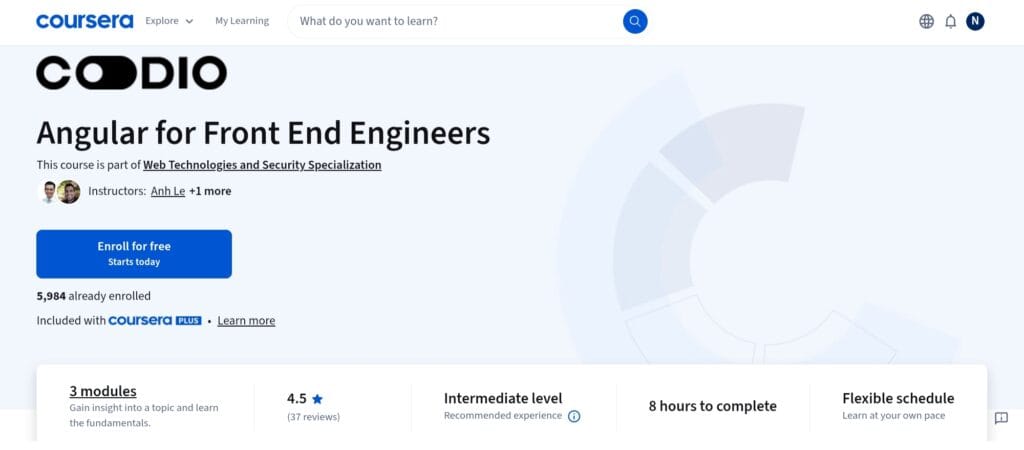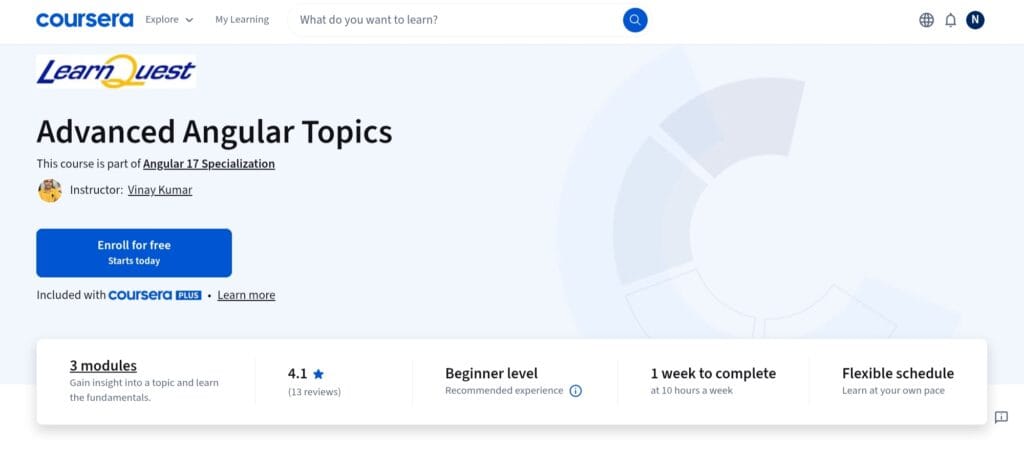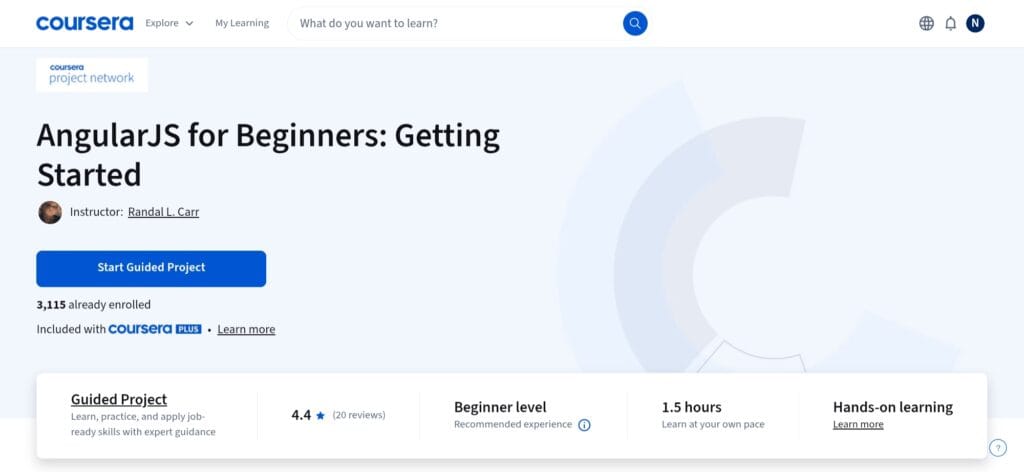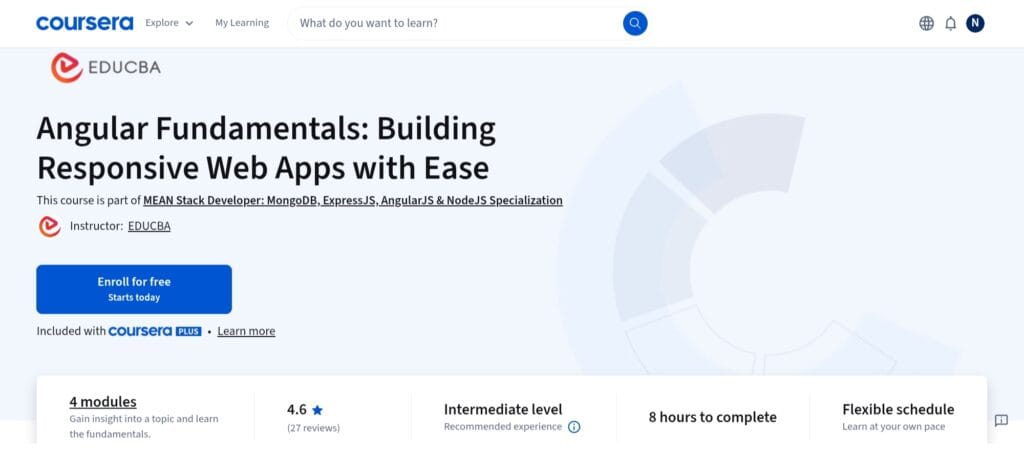Last updated on January 8th, 2026 at 10:20 am
Front-end development is more than just writing neat HTML and CSS in the rapidly evolving digital world of today. One of the most effective frameworks for achieving the speed, scalability, and interaction that modern web applications require is Angular.
Learning Angular can lead to fascinating projects and well-paying jobs. Regardless of your background, you may be a professional seeking to improve your front-end abilities, a computer science student, or an aspiring web developer.
In India, where the digital economy is flourishing, businesses from a variety of sectors are looking for Angular developers with the ability to create enterprise-grade, dynamic, and responsive applications.
It is essential to learn Angular correctly. Even while there are a ton of lessons available online, not all of them offer a formalized curriculum or accreditation. Here’s where Coursera is unique.
You can learn from the finest and obtain a certificate that enhances your professional profile with Coursera, a reputable international platform that offers courses from leading institutions and industry experts.
These internationally recognized certifications can be displayed on your resume or LinkedIn profile to demonstrate your confirmed proficiency in contemporary web development.
I’ve selected the top 6 best Angular courses on Coursera in this post so you can confidently begin or continue your education.
Every course has undergone a thorough evaluation process that takes into account its syllabus, instructor experience, practical projects, student comments, and certification worth.
In conclusion, you will be able to determine which course is best for your level of expertise, whether you are a total novice, an intermediate student honing your front-end skills, or an experienced developer looking to learn more complex Angular techniques.
Prepare to learn more about the best Coursera courses that can help you switch to Angular for web development.
Why Learn Angular? (And Why on Coursera)
One of the most reliable and advanced frameworks for contemporary web development is Angular. It is a TypeScript-based front-end framework that Google developed and maintains to assist developers in producing fast, scalable, and interactive single-page applications (SPAs).
Angular provides an end-to-end solution for creating dynamic web apps, from data binding and routing to testing and deployment, in contrast to earlier JavaScript frameworks that just manage specific aspects of a website.
For those who are serious about front-end web development, this completes the ecosystem.
Over the past few years, there has been a significant increase in demand for qualified Angular developers in India. Angular is used by startups, IT consulting firms, and big businesses to provide responsive user interfaces for finance dashboards, e-commerce platforms, healthcare systems, and educational websites.
Developers who can use Angular’s modular architecture, reusable components, and TypeScript integration to create safe, maintainable apps are highly valued by employers.
Learning Angular is now essential for professionals and students in India who want to improve their web development job abilities; it’s a calculated step toward remaining competitive in the digital job market.
Enrolling in an Angular course on Coursera guarantees that, under the supervision of an expert, you will acquire both theoretical knowledge and practical application.
From learning the basics of TypeScript to putting real-world Angular projects into practice, Coursera’s well-organized curriculum guides students through each step of the process.
Additionally, each course is supported by an industry-recognized certification, which increases your visibility to employers globally and verifies your skills.
During job interviews or on professional sites like LinkedIn, you can proudly display your Coursera certificate as a reliable demonstration of your proficiency.
To put it briefly, learning Angular on Coursera offers the best of both worlds: a robust front-end framework and a widely recognized learning environment.
When combined, they offer a straightforward, guided approach to developing applications that are notable for their functionality and appearance, all while boosting your web development career.
List of the Best Angular Courses on Coursera
Here are my top picks for Angular Courses on Coursera.
1. Single Page Web Applications with AngularJS
Web developers who wish to create dynamic, maintainable, and testable single-page apps (SPAs) can enroll in Coursera’s intermediate-level course, Single Page Web Applications with AngularJS.
The course covers fundamental concepts like controllers, services, directives, routing, dependency injection, and unit testing with an emphasis on AngularJS.
Students get hands-on experience building usable SPAs through video lectures, books, and practical coding tasks. They also strengthen their grasp of testable front-end architecture and code organization.
The course offers flexible deadlines, self-paced learning, and access to all resources, including texts and source code. Despite being a more recent framework than Angular 2+ or React, AngularJS is still useful for working on legacy projects and comprehending the basics of SPA.
Students gain from interactive tasks, tests, and a shareable Johns Hopkins University certificate upon finishing, which makes it a respectable addition to a developer’s portfolio.
For intermediate learners, this course provides an organized, useful, and entertaining approach to learning SPA development.
It is the best option for anyone who wants to improve their front-end abilities, obtain practical experience, and obtain a respected certification.
For those aiming for the newest frameworks, the AngularJS focus could seem a little out of date, and prior understanding of HTML, CSS, and JavaScript is necessary.
2. Frontend Development using Angular
For students with a foundational understanding of web development, Board Infinity offers an intermediate-level course on Coursera called Frontend Development using Angular.
With a projected weekly time commitment of 10 hours, the course lasts roughly three weeks and offers a systematic introduction to Angular, a top framework for creating scalable and dynamic web apps.
The course is divided into three modules, and those are as follows.
- Introduction to HTML & CSS
- Introduction to JavaScript Programming
- Angular Front End Development
These modules will equip you with foundational concepts of front-end development and core Angular concepts to empower you to build complex and maintainable applications.
Students complete practical activities, tests, and projects throughout the course to reinforce theoretical topics.
By the end, participants will know how to use Angular to create solid frontend applications, which will prepare them for more complex subjects in later courses in the Learning MEAN Stack by Building Real World Application Specialization.
3. Angular for Front-End Engineers
Codio offers an intermediate-level course called Angular for Front-End Engineers on Coursera that is designed for students who have a basic understanding of HTML, CSS, and JavaScript.
The emphasis of this practical training is Angular, a potent framework for creating scalable and dynamic online apps. Students work through interactive modules covering key Angular topics, including components, templates, and data binding, over the course of about eight hours.
At the end of the course, a fully functional to-do application is developed, giving students hands-on experience using Angular for real-world tasks.
With interactive tests, fast feedback, and a style free of videos, this self-paced course enables students to acquire topics through practice rather than passive viewing.
The fundamental ideas of Angular are guaranteed to be better understood and retained with this method. After completing the course, participants improve their professional credentials by gaining useful front-end development skills and obtaining a shareable certificate from Codio.
4. Advanced Angular Topics
LearnQuest’s Advanced Angular Topics course on Coursera is geared toward students who have a basic understanding of HTML, CSS, and JavaScript.
This course explores Angular 17’s advanced capabilities with an emphasis on improving single-page applications’ (SPAs’) functionality and structure.
Over the course of about 13 hours, students study important ideas including data binding, directives, pipes, routing, component input and output characteristics, container and nested components, and more.
In order to help participants create more structured, reusable, and effective Angular applications, the course places a strong emphasis on practical application through practical exercises, tests, and assignments.
The course is structured into three comprehensive modules that will enhance your Angular skills.
You will discover how to nest components and control data flow between them with input and output properties to produce reusable and well-organized code structures in the first module.
The second module covers Angular components, experiments with different data binding strategies, and uses Angular directives to handle forms, lists, and styles.
The final module teaches how to use pipes to transform data and use routing to move between views in your application.
After finishing, students will be ready for more complicated subjects in the Angular 17 Specialization by knowing how to create intricate and sustainable SPAs using Angular 17. The self-paced course gives students freedom and, following successful completion, a shareable certificate.
5. AngularJS for Beginners: Getting Started
The Coursera Project Network offers a project-based, introductory course called AngularJS for Beginners: Getting Started.
This 1.5-hour course offers a practical introduction to AngularJS, emphasizing its essential elements and how they cooperate in a development environment. It is intended for students who have a basic understanding of HTML, CSS, and JavaScript.
In this guided project, you will learn about Angular components, such as modules, controllers, and filters, and how they function in an Angular application.
The project will develop practical skills on how to customize Angular code and create simple applications.
By the end of the course, you will gain problem-solving skills, gain experience with real-world examples, and learn how to apply your knowledge effectively.
Those who want a foundational and practical course on Angular to start building Angular applications can consider joining this course.
6. Angular Fundamentals: Building Responsive Web Apps with Ease
For students who have a firm grasp of HTML and CSS, EDUCBA offers an intermediate-level course on Coursera called Angular Fundamentals: Building Responsive Web Apps with Ease.
AngularJS is thoroughly introduced in this 8-hour self-paced course, which focuses on creating responsive and modular online apps.
Important subjects covered in the curriculum include: AngularJS architecture, data binding, components, templates, routing, navigation, form controls, services, state management, user authentication, role-based access control, testing, debugging, and integrating Bootstrap for responsive design.
Through 17 assignments and real-world activities, students get practical experience creating applications with the MEAN stack (NodeJS, AngularJS, ExpressJS, and MongoDB).
After finishing, participants will be equipped with the knowledge and abilities to use AngularJS and Bootstrap to create dynamic and maintainable web applications, setting them up for more complex web development topics. Your accomplishments can be displayed with a shareable certificate.
Conclusion
These Coursera courses offer an organized learning path to fit any skill level, whether you are a newbie keen to learn about front-end development or an intermediate developer hoping to grasp complex Angular principles.
Through project-based and hands-on courses like Angular for Front-End Engineers and Advanced Angular Topics, as well as foundational courses like AngularJS for Beginners: Getting Started, students can acquire both theoretical knowledge and real-world experience.
When taken as a whole, these courses give students the tools they need to create scalable, dynamic, and maintainable web apps, equipping them for front-end development jobs of the future or for upskilling in older Angular projects.
You will confidently improve your Angular expertise, create professional-caliber applications, and obtain reputable certificates that bolster your portfolio and web development employment prospects by selecting the appropriate combination of these courses based on your objectives and experience.
FAQ
Can I learn Angular without prior programming experience?
It is advised that before beginning Angular, one has a fundamental familiarity with HTML, CSS, and JavaScript. But classes like Angular Fundamentals: Building Responsive Web Apps with Ease and Frontend Development using Angular walk students through the process step-by-step, making the move easier even for novices.
Which course focuses more on practical, hands-on learning?
Codio’s Angular for Front-End Engineers utilizes an interactive coding environment and is fully project-based. Learners practice in-browser while creating actual applications, getting immediate feedback in place of video lectures.
Are Coursera Angular courses worth it for career growth?
Yes. These Coursera courses, which offer respected credentials and in-demand Angular skills, are provided by reputable organizations like Johns Hopkins University and Codio. Your employability in the tech sector is improved, your portfolio is strengthened, and you become eligible for front-end development positions if you finish them.
Share Now
More Articles
Best React Native Courses Web Developers Can Join
Best Website Builders for Beginners
Common Web Development Mistakes Developers Make And How To Avoid Them
Discover more from technicalstudies
Subscribe to get the latest posts sent to your email.


